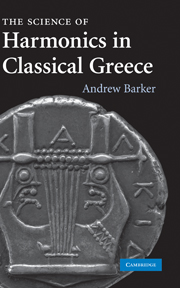Book contents
- Frontmatter
- Contents
- List of figures
- Preface
- Part I PRELIMINARIES
- Part II EMPIRICAL HARMONICS
- Part III MATHEMATICAL HARMONICS
- Chapter 10 Pythagorean harmonics in the fifth century: Philolaus
- Chapter 11 Developments in Pythagorean harmonics: Archytas
- Chapter 12 Plato
- Chapter 13 Aristotle on the harmonic sciences
- Chapter 14 Systematising mathematical harmonics: the Sectio canonis
- Chapter 15 Quantification under attack: Theophrastus' critique
- Postscript: the later centuries
- Bibliography
- Index of proper names
- General index
Chapter 13 - Aristotle on the harmonic sciences
Published online by Cambridge University Press: 22 September 2009
- Frontmatter
- Contents
- List of figures
- Preface
- Part I PRELIMINARIES
- Part II EMPIRICAL HARMONICS
- Part III MATHEMATICAL HARMONICS
- Chapter 10 Pythagorean harmonics in the fifth century: Philolaus
- Chapter 11 Developments in Pythagorean harmonics: Archytas
- Chapter 12 Plato
- Chapter 13 Aristotle on the harmonic sciences
- Chapter 14 Systematising mathematical harmonics: the Sectio canonis
- Chapter 15 Quantification under attack: Theophrastus' critique
- Postscript: the later centuries
- Bibliography
- Index of proper names
- General index
Summary
The only sustained discussion of musical issues in Aristotle's surviving works is in the last book of the Politics. Like the conversations in Book iii of Plato's Republic, to which it is in part a response, it focuses on the value of music in the life of a city and its citizens, and it says nothing about the musical sciences. It alludes several times, however, to the work of unnamed experts in musicology, at least some of whom were Aristotle's contemporaries. This suggests that he had some acquaintance with up-to-date studies by musical specialists, perhaps including their work in harmonics; and references to harmonic science, and to concepts used by its exponents, are scattered here and there in his other writings. Almost all of them are brief. It seems fairly clear that Aristotle made no substantial contributions of his own to the subject, and that it was marginal to his main areas of interest. I shall argue, too, that despite the confidence of his various pronouncements, his grasp on some of its concepts and procedures was a little uncertain.
A study of his remarks pays dividends none the less, for three main reasons. First, slight though they are, they contribute rather more than has generally been recognised to our knowledge of mathematical harmonics in the fourth century, especially in its Pythagorean form.
- Type
- Chapter
- Information
- The Science of Harmonics in Classical Greece , pp. 328 - 363Publisher: Cambridge University PressPrint publication year: 2007



